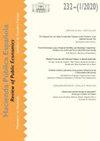是什么推动了税务士气?关注新兴经济体
IF 0.7
4区 经济学
Q3 ECONOMICS
Hacienda Publica Espanola-Review of Public Economics
Pub Date : 2013-01-01
DOI:10.7866/HPE-RPE.13.4.1
引用次数: 64
摘要
本文回顾了文献,并提供了一些基于世界价值观调查的证据,这些证据是关于全球税收士气的驱动因素,重点是发展中国家。研究表明,年龄、宗教、性别、就业状况和受教育程度等社会经济因素对人们的纳税士气水平有显著影响。在制度决定因素方面,对民主的满意度、对政府的信任和对公共服务质量的满意度在提高税收士气方面发挥着重要作用。本文还讨论了该领域未来的研究方向和政策行动本文章由计算机程序翻译,如有差异,请以英文原文为准。
What Drives Tax Morale? A Focus on Emerging Economies
This paper reviews the literature and contributes with some evidence based on the World Values Survey on the drivers of tax morale worldwide, with an emphasis on developing countries. It shows that socio-economic factors such as age, religion, gender, employment status and educational attainment have a significant impact on people’s levels of tax morale. In terms of institutional determinants, satisfaction with democracy, trust in government and the satisfaction with the quality of public services play an important role in increasing tax morale. The paper also discusses future directions for research and policy action in this area
求助全文
通过发布文献求助,成功后即可免费获取论文全文。
去求助
来源期刊

Hacienda Publica Espanola-Review of Public Economics
Economics, Econometrics and Finance-Finance
CiteScore
0.90
自引率
14.30%
发文量
14
期刊介绍:
Hacienda Pública Española/Review of Public Economics welcomes submissions on all areas of public economics. We seek to publish original and innovative research, applied and theoretical, related to the economic analysis of Government intervention. For example, but not exclusively: Taxation, Redistribution, Health, Education, Pensions, Governance, Fiscal Policy and Fiscal Federalism.
In addition to regular submissions, the journal welcomes submissions of:
-Survey Reviews, containing surveys of the literature regarding issues of interest in the Public Economics field;
-Policy oriented reviews, showing the current contributions of Public Economics in relation to relevant contemporary issues affecting public decision-makers in the real world (Policy Watch);
-Comments of previously published articles. Contributions to this section should be limited to a maximum of 2 000 words (12 pages). If deemed adequate, the authors of the commented article will be given the opportunity to react in a Reply. Both Comment and Reply will be published together.
Articles for the Survey Reviews and Policy Watch section are subject to the same double blind reviwing procedure. The adequacy of Comments submitted for publication will be evaluated by the Executive Editors.
 求助内容:
求助内容: 应助结果提醒方式:
应助结果提醒方式:


